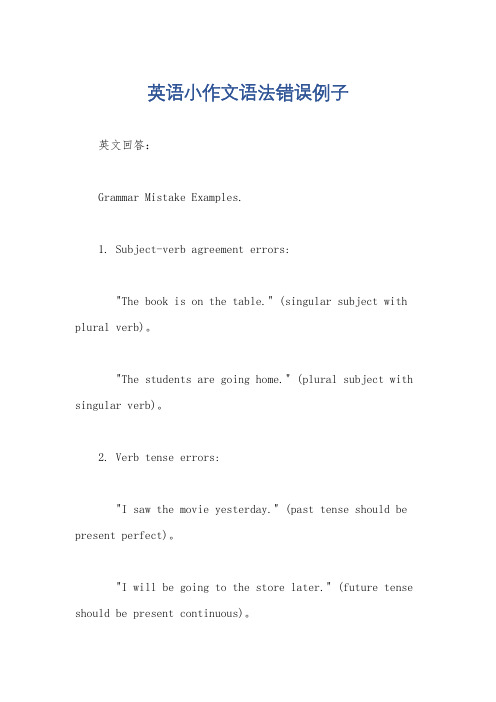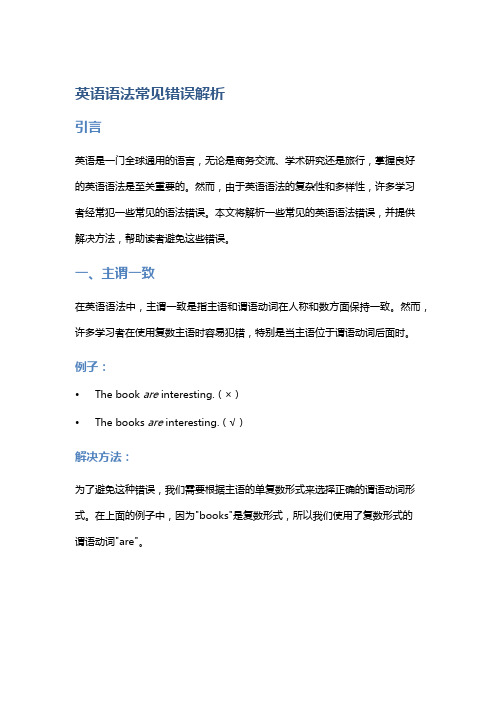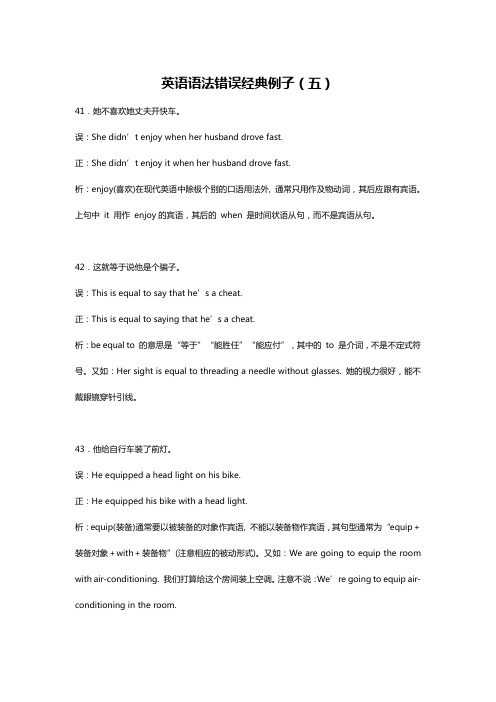英语语法错误经典例子(五)
考研英语作文写作最易扣分的语言错误(精选5篇)

考研英语作文写作最易扣分的语言错误(精选5篇)篇1:考研英语作文写作最易扣分的语言错误考研英语作文写作最易扣分的语言错误语言的准确性和多样性是写作中一个十分关键的考查点。
这就要求我们首先要保证语言的准确性,在准确的基础上就多样。
那么考生的写作中常犯的语言错误有哪些呢?下面将从词、句、段三个层面给大家分析考生常犯的错误,希望各位同学能够引以为戒。
考研英语中,写作部分是对考生能力的综合性的考查。
主要考查的是学生的语言基本功,逻辑思维能力以及文化素养等。
根据大纲中对大小作文评分侧重点的规定,大作文的评分重点在于“内容完整性、文章的组织连贯性、语法结构和词汇的多样性及语言的准确性”,应用文的评分侧重点在于“信息点的覆盖和内容的组织、语言的准确性、格式和语域的恰当,”我们可以看出,语言的准确性和多样性是写作中一个十分关键的考查点。
这就要求我们首先要保证语言的准确性,在准确的基础上就多样。
那么考生的写作中常犯的语言错误有哪些呢?下面将从词、句、段三个层面给大家分析考生常犯的错误,希望各位同学能够引以为戒。
首先,从词的层面来说,常见的问题包括:(1)词性使用错误。
比如“Some children study very diligent”,这句话中,diligent是形容词,不能修饰动词study,必须改为diligently 或者hard。
(2) 随意编造词汇。
在的作文中图画展示了两个残疾人互相搀扶,扔掉拐杖的画面。
有学生写到“Both of the two men need lamesticks”,显然,学生因为不记得“拐杖”的英语表达,自己生造了lamesticks 这个词。
实际上,可用来表达“拐杖”的意义的词很多,比如 stick, walking stick, staff, crutch, cane. 等。
实在不会,也可以用helping tools, exterior supports , walking aids, sticks that help them to walk等间接的表达方式,无论如何也不能编造单词,更不能用汉语拼音Guai Zhang。
英语语法错误分类(史上最全)

英语语法错误分类(史上最全)一.不一致(Disagreements)所谓不一致不光指主谓不一致,它还包括了数的不一致时态不一致及代词不一致等.例1.When one have money ,he can do what he want to .(人一旦有了钱,他就能想干什么就干什么.)剖析:one是单数第三人称,因而本句的have应改为has ;同理,want应改为wants.本句是典型的主谓不一致.改为:Once one has money ,he can do what he wants (to do) 二.修饰语错位(Misplaced Modifiers)英语与汉语不同,同一个修饰语置于句子不同的位置,句子的含义可能引起变化.对于这一点中国学生往往没有引起足够的重视,因而造成了不必要的误解.例1.I believe I can do it well and I will better know the world outside the campus.剖析:better位置不当,应置于句末.三.句子不完整(Sentence Fragments)在口语中,交际双方可借助手势语气上下文等,不完整的句子完全可以被理解.可是书面语就不同了,句子结构不完整会令意思表达不清,这种情况常常发生在主句写完以后,笔者又想加些补充说明时发生.例1.There are many ways to know the society. For example by TV ,radio ,newspaper and so on .剖析:本句后半部分"for example by TV ,radio ,newspaper and so on .”不是一个完整的句子,仅为一些不连贯的词语,不能独立成句.改为:There are many ways to know society ,for example ,by TV ,radio ,and newspaper.四.悬垂修饰语(Dangling Modifiers)所谓悬垂修饰语是指句首的短语与后面句子的逻辑关系混乱不清.例如:At the age of ten, mygrandfather died. 这句中"at the age of ten"只点出十岁时,但没有说明” 谁”十岁时.按一般推理不可能是my grandfather, 如果我们把这个悬垂修饰语改明确一点,全句就不那么费解了.改为:When I was ten, my grandfather died.例1.To do well in college, good grades are essential.剖析:句中不定式短语“to do well in college” 的逻辑主语不清楚.改为:To do well in college, a student needs good grades.五.词性误用(Misuse of Parts of Speech)“词性误用”常表现为:介词当动词用;形容词当副词用;名词当动词用等.例1.None can negative the importance of money.剖析:negative 系形容词,误作动词。
英语小作文语法错误例子

英语小作文语法错误例子英文回答:Grammar Mistake Examples.1. Subject-verb agreement errors:"The book is on the table." (singular subject with plural verb)。
"The students are going home." (plural subject with singular verb)。
2. Verb tense errors:"I saw the movie yesterday." (past tense should be present perfect)。
"I will be going to the store later." (future tense should be present continuous)。
3. Pronoun errors:"I gave the book to she." (incorrect pronoun case)。
"The dog and cat are playing with each other." (incorrect pronoun reference)。
4. Adjective and adverb errors:"The car is very fast." (incorrect use of adverb)。
"The book is more interesting than the movie." (incorrect use of comparative adjective)。
5. Preposition errors:"I went to the store at the street." (incorrect preposition)。
英语语法常见错误解析

英语语法常见错误解析引言英语是一门全球通用的语言,无论是商务交流、学术研究还是旅行,掌握良好的英语语法是至关重要的。
然而,由于英语语法的复杂性和多样性,许多学习者经常犯一些常见的语法错误。
本文将解析一些常见的英语语法错误,并提供解决方法,帮助读者避免这些错误。
一、主谓一致在英语语法中,主谓一致是指主语和谓语动词在人称和数方面保持一致。
然而,许多学习者在使用复数主语时容易犯错,特别是当主语位于谓语动词后面时。
例子:•The book are interesting.(×)•The books are interesting.(√)解决方法:为了避免这种错误,我们需要根据主语的单复数形式来选择正确的谓语动词形式。
在上面的例子中,因为"books"是复数形式,所以我们使用了复数形式的谓语动词"are"。
二、冠词的用法错误冠词在英语语法中的使用是让很多学习者感到困惑的问题之一。
有时候,学习者会忽略冠词的使用,导致语法错误。
例子:•I want to buy a iPhone.(×)•I want to buy an iPhone.(√)解决方法:使用冠词时需要根据后面的词的发音来选择正确的冠词。
在上面的例子中,由于"Iphone"这个词的发音以元音音素开头,所以我们需要使用冠词"an"。
三、动词时态错误英语的动词时态非常丰富,但是许多学习者在使用时态时容易出错。
一个常见的错误是将动词的过去分词形式与助动词"have"以及"has"错误地搭配使用。
例子:•I have went to the park yesterday.(×)•I have gone to the park yesterday.(√)解决方法:在这种情况下,正确的形式应该是"have gone"。
高考必考语法改错之系动词十大经典错误

• eat continue last remain • ⑤ ⑥ ⑦ continue ⑧ stay
• taste keep remain leave
系动词知识体系
系动词十大典型错误例析
【改错】高考链接 少be动词
Байду номын сангаас
1.CThhienya^eaangdear stokekdnomwe
everything about lots of questions.
were
注意! be eager to do …渴望做某事
系动词十大典型错误例析
【改错】高考链接 少be动词
2.kI’ndolwikemtoor^eyoaubropuet ny-ofurirencodu, anntrdy.get to
His hands feel coldly.
• 在英语中,某一动词是多义词,既有实义 动词用法,又有系动词用法。学生务必弄 清其二者区别。切忌把二者混为一谈,这 也是会考、高考常见考点。此类常见易混 词有:
• change listen look touch • ① turn ② hear ③ see ④
time.
注意! 注意:如果一个职位在一定
2)W时 名e期 词el内做ec由表te一语d h个、im人 宾m担 补o任 和nit时 同or, 位of这 语o个 时ur 表,cla示常ss职不. 位用的冠
词。
3)Mr.Hunter,captain of the team,loves
playing football.
练
being
系动词十大典型错误例析
【改错】
3.They gradually b_e_c_am__e to enjoy their
语法错误的英文

语法错误的英文语法错误用英文怎样表达,它的拼写是?下面是店铺给大家整理的语法错误的英文,供大家参阅!语法错误的英文grammatical mistake常见英语语法错误1、从句成份缺失Nowadays, many people believe that people who always telling the true things.修改为:people who always telling the true things are of reliability.点评:中国学生容易丢掉一些复合句中从句的某部分,需要加强对长复合句子的把握能力。
2、使动词当意动词用I frustrate about the phenomenon that nobody wants to help the poor.修改为:The phenomenon that nobody wants to help the poor frustrates me.或:The phenomenon that nobody wants to help the poor makes me frustrated.点评:frustrate是使动词,表示“使…沮丧”,“某事使我沮丧”应该表示为“sth. frustrates me”。
类似的易用错的使动词还有disappoint,surprise,distress,prepare,adapt,remind, concern等3、及物动词与不及物动词不区分My parents’ opinions usually influence to me.Everybody laughs him when he comes.修改为:My parents’ opinions usually influence me.Everybody laughs at him when he comes.点评:influence是及物动词,不需要加介词。
英语语法错误经典例子(五)

英语语法错误经典例子(五)41.她不喜欢她丈夫开快车。
误:She didn’t enjoy when her husband drove fast.正:She didn’t enjoy it when her husband drove fast.析:enjoy(喜欢)在现代英语中除极个别的口语用法外, 通常只用作及物动词,其后应跟有宾语。
上句中it 用作enjoy的宾语,其后的when 是时间状语从句,而不是宾语从句。
42.这就等于说他是个骗子。
误:This is equal to say that he’s a cheat.正:This is equal to saying that he’s a cheat.析:be equal to 的意思是“等于”“能胜任”“能应付”,其中的to 是介词,不是不定式符号。
又如:Her sight is equal to threading a needle without glasses. 她的视力很好,能不戴眼镜穿针引线。
43.他给自行车装了前灯。
误:He equipped a head light on his bike.正:He equipped his bike with a head light.析:equip(装备)通常要以被装备的对象作宾语, 不能以装备物作宾语,其句型通常为“equip+装备对象+with+装备物”(注意相应的被动形式)。
又如:We are going to equip the room with air-conditioning. 我们打算给这个房间装上空调。
注意不说:We’re going to equip air-conditioning in the room.44.他设法躲避惩罚。
误:He tried to escape from punishment.正:He tried to escape punishment.析:escape 表示逃避或躲避不愉快的事(如危险,处罚,不幸,灾难等),是及物动词,其后无需用介词。
四级语法常见错误总结

四级语法常见错误总结一、代词的一致性错误代词与其所代替的名词在性、数、人称上应保持一致。
常见错误包括:1. 主谓代词一致性错误:例子:Neither of the boys have finished their homework.改正:Neither of the boys has finished his homework.2. 主、宾语代词一致性错误:例子:Everyone should do what they can to protect the environment.改正:Everyone should do what he or she can to protect the environment.3. 名词所有格代词一致性错误:例子:The students should bring there books to his or her desk.改正:The students should bring their books to their desks.二、动词时态和语态错误1. 时态错误:学生常常在叙述过去事件时使用错误的时态,如将过去事件使用现在进行时等。
例子:Last night, I am going to the theater.改正:Last night, I went to the theater.2. 语态错误:例子:The tree was cut down by my father.改正:The tree was cut down by me.三、冠词误用1. 不必要的冠词使用错误:例子:I saw a interesting movie yesterday.改正:I saw an interesting movie yesterday.2. 缺少必要的冠词:例子:He is student.改正:He is a student.四、介词和动词搭配错误1. 使用错误的介词:例子:I am interested with learning English.改正:I am interested in learning English.2. 动词搭配错误:例子:She depends for me to help her.改正:She depends on me to help her.五、句子结构错误1. 并列句结构错误:例子:I like to watch movies, but I don't like swimming.改正:I like to watch movies, but I don't like to swim.2. 定语从句结构错误:例子:The book, that I borrowed it from the library, is very interesting.改正:The book, which I borrowed from the library, is very interesting.六、介词的位置错误介词通常应该放在它所修饰的名词或代词之后。
- 1、下载文档前请自行甄别文档内容的完整性,平台不提供额外的编辑、内容补充、找答案等附加服务。
- 2、"仅部分预览"的文档,不可在线预览部分如存在完整性等问题,可反馈申请退款(可完整预览的文档不适用该条件!)。
- 3、如文档侵犯您的权益,请联系客服反馈,我们会尽快为您处理(人工客服工作时间:9:00-18:30)。
英语语法错误经典例子(五)
41.她不喜欢她丈夫开快车。
误:She didn’t enjoy when her husband drove fast.
正:She didn’t enjoy it when her husband drove fast.
析:enjoy(喜欢)在现代英语中除极个别的口语用法外, 通常只用作及物动词,其后应跟有宾语。
上句中it 用作enjoy的宾语,其后的when 是时间状语从句,而不是宾语从句。
42.这就等于说他是个骗子。
误:This is equal to say that he’s a cheat.
正:This is equal to saying that he’s a cheat.
析:be equal to 的意思是“等于”“能胜任”“能应付”,其中的to 是介词,不是不定式符号。
又如:Her sight is equal to threading a needle without glasses. 她的视力很好,能不戴眼镜穿针引线。
43.他给自行车装了前灯。
误:He equipped a head light on his bike.
正:He equipped his bike with a head light.
析:equip(装备)通常要以被装备的对象作宾语, 不能以装备物作宾语,其句型通常为“equip+装备对象+with+装备物”(注意相应的被动形式)。
又如:We are going to equip the room with air-conditioning. 我们打算给这个房间装上空调。
注意不说:We’re going to equip air-conditioning in the room.
44.他设法躲避惩罚。
误:He tried to escape from punishment.
正:He tried to escape punishment.
析:escape 表示逃避或躲避不愉快的事(如危险,处罚,不幸,灾难等),是及物动词,其后无需用介词。
但若是表示从某体场所逃走、从管制或监禁中逃走、液体或气体从管中漏出等,均为不及物动词,可与介词from 连用。
如:Some gas is escaping from the pipe. 煤气管在漏气。
A lion has escaped from its cage. 有一只狮子从笼子里逃走了。
比较:He escaped prison. 他躲避了监禁。
(本该入狱但逃避了,即逃避了不愉快的事,及物) He escaped from prison. 他越狱了。
(已经入狱但逃走了,即从管制或监禁中逃走,不及物)
45.他除了身体不舒服外,每天都上图书馆。
误:He goes to the library every day except that he is not well.
正:He goes to the library every day except when he is not well.
析:except that和except when 均可后接句子,但两者在语义上有差别:即后者的when 含有“当……时候”的意思,前者则没有这层意思。
比较:I know nothing about him except that he is Paris. 我只知道他是巴黎人,其他的就什么都不知道了。
He never came except when he was in trouble. 除了(当他)遇到麻烦(的时候)以外,他从不来。
46.法官非常注意这一情况,即孩子在家里并不快乐。
误:The judge paid a lot of attention to that the child was unhappy at home.
正:The judge paid a lot of attention to the fact that the child was unhappy at home.析:按英语习惯,除极个别介词(如except, but 等)外,一般的介词之后均不能直接跟that 从
句。
如语义上需要接这类从句,则通常使用the fact that 这一结构。
注:在这类句型中,the fact 用作前面介词的宾语,其后that从句为修饰the fact 的同位语从句,用以说明the fact 的具体内容。
47.我们了解他的性格。
误:We are familiar to his character.
正:We are familiar with his character.
析:familiar(熟悉的)有以下两类用法须注意:一是表示某人熟悉某事物,此时通常只用作表语,且在其后连用介词with;二是表示某事物为某人所熟悉,此时可用作表语或定语,其后通常连用介词to。
比较:We are familiar with the saying. 我们熟悉这条格言。
The saying is familiar to us. 这条格言我们熟悉。
48.到目前为止,这工作很容易,但情况可能有变化。
误:So far the work is easy but things may change.
正:So far the work has been easy but things may change.
析:so far有两个主要意思:一是表示“到目前为止”,强调的是从过去持续到现在的一段时间,所以通常与现在完成时连用;另一个意思是表示“到这种程度或范围”,此时可根据情况选用时态,如:I can only help him so far. 我只能帮他到这种程度。
49. 我想笑,但是不敢笑。
误:I felt like to laugh, but I didn’t dare.
正:I felt like laughing, but I didn’t dare.
析:feel like 中的like 不是动词,是介词,所以其后只能接名词或动名词,不能接不定式。
feel like 的主要用法有“想要”“摸起来像”“(感到)像是……”,如:It feels like silk. 这东西摸起来像丝绸。
I feel like catching a cold. 我像是感冒了。
50. 每周推出数以百计的新唱片,但(其中)没有几张能进入每周流行榜。
误:Hundreds of new records are produced each week but a few (of them) get into the charts.
正:Hundreds of new records are produced each week but few (of them) get into the charts.
析:few 和a few均表示复数意义,few 表示数量很少或几乎没有,强调“少”,含有否定意义;a few 表示数量虽然少但毕竟还有,强调“有”,含有肯定意义。
比较:His theory is very difficult, and few people understand it. 他的理论很深奥,没有几个人能懂。
His theory is very difficult, but a few people understand it. 他的理论很深奥,但是有些人懂。
